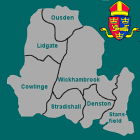  |
 |
 |
 |
 |
| Wed 17 Dec 2025 |

Church News Volume 5, Issue 6 (May 2004)Dear friends, Do you remember the 1960's television drama "The Prisoner"? The story was of a former secret agent who is wrongly imprisoned on a secret island and his attempts to break free. He was assigned a number (six) instead of a name. He insists to his captor that he is not a number, he is a free man! It is a story about personal identity and freedom. When Jesus rose from the tomb on that first Easter morning and appeared to Mary Magdalene in the Garden, she at first thought Him to be the gardener. Jesus spoke her name "Mary" and at once she recognised who it was she was talking to. This story is also about personal identity and freedom. For of all the Biblical accounts of the resurrection of Jesus this is surely the most personal. Male or female we can identify with Mary's Easter experience. This was her personal journey to faith, a journey we all must make. This is a story of how one person moved from fear and doubt to a deep faith in the Risen Lord. It is a story which begins with weeping outside the tomb. It ends with Mary's voice of conviction to the others "I have seen the Lord!" The despair Mary must have felt after having seen her friend die a horrible and undeserved death on the Friday, laid in the tomb, was compounded on the Sunday when she went to the tomb early in the morning to see what else she might do to grieve, to be close to her dead Lord, she found the body gone! Stolen, she thought, and in her tears she asked the gardener if he had taken the body away for some reason. But there, in her deepest grief, she met with the Lord and her despair was turned in a instant to great joy. Jesus spoke her name, he addresses her personally. At that point her grief and doubt, fear and sorrow, vanish like the morning dew. Mary is freed from the prison of her despair, freed into a new relationship with her Saviour: one in which she clings no longer to the earthly Jesus but runs off to tell the others about the risen Lord. Mary is sent by Jesus to be the first apostle of the resurrection. When Jesus spoke her name, Mary turned from fear to faith. That is exactly what happens to us when we believe the Easter story, when Jesus speaks directly to us and calls us by our name. When Jesus ceases to be just a character from the Bible, a good man who lived many years ago, to be a real and living presence in our life. Then we know that the Lord is risen indeed for we have met Him on the road and heard Him speak our name. We know then that He has died and risen again for us personally. He has conquered sin and dearth on our behalf, set us free, and is sending us to share that good news with others. In the TV drama "The Prisoner" it was important for the central character that he should not loose his personal identity. That is what make us truly human beings. We are not numbers in the divine database of heaven, but we are free people, individuals, loved by God as individuals. We each have different personalities, different gifts, different strengths And weaknesses. We all have moments of doubt in our lives, times when grief, pain and despair blind us, like Mary in the garden, to Jesus' presence next to us. But He goes on calling our name, waiting for us to recognise Him and to say, with Mary, "I have seen the Lord!" And every time that happens in our life, every time we glimpse the presence of God with us in this world, these are Easter moments. May you too know the joy of meeting the Lord and hear Him call your name. The Lord is Risen, He is risen indeed. Alleluia! Revd Ian M. Finn |

